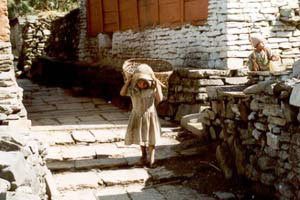Child labor is so commonplace in Nepal that to most Nepalese, it is unremarkable and therefore invisible. But even more appalling is the situation of child domestic labor, one of the worst forms of human labor made more shameful because of the fact that it goes on unabated and unchecked under the same middle class roof whose occupants profess to be upright citizens of the country who take social issues seriously.
Children have always had to help their families in Nepal, but in the recent years the rising tide of violence and poverty in rural Nepal are fueling urban migration at unprecedented rate. This trend has led to the establishment of an informal labor industry, which supplies cheap labor to urban businesses. All too often, the workers are children, sold into bondage by brokers in the urban industries to pay off interests on loans which desperate parents have taken. A recent study indicated that there are 2.6 million working children (5-18 yrs) in Nepal which accounts for 14.7 percentage of the total population of children aged 5 to 18 years. Of these, 55,000 children were involved in domestic work in urban households according to the ILO. Similarly, a report presented by Children-Women in Social Service and Human Rights (CWISH) has revealed that children below the age of 14 years form 80 percent of the domestic workforce, contradicting the law which prohibits employing children below 14.
City life undoubtedly has tremendous attraction for people from poor rural areas. And domestic service is seen as a secure position that guarantees food, shelter clothing and sometimes even education and poor parents regard this life as much better than the one they could provide their children at home. Poor rural families with connections in town try to place their children as domestic servants to wealthier families a practice which is a direct extension of the one that prevailed in the villages of Nepal centuries ago. And today, almost every middle class house holds in Kathmandu and other big cities “owns” a child domestic worker. Employers particularly prefer hiring 11-18 year olds simply because they are children who are more docile and less likely to make demands for outings or raise, and are also less likely to get married or runaway, anytime soon. And for obvious reasons like their submissiveness, silence, docility compared to boys, the “employers” prefer girls. And also girls are considered to be fit for household work.
After the children are indentured, there is almost no limit to the amount and the kind of work that they have to perform as they hover around their masters at their beck and call. They have to cook, clean, baby-sit, escort children from school, shop, tend the garden and even lend a helping hand when there is any construction work at home. In other words, under the guise of “employing” children and providing them with food cloth and shelter, they are being exploited so that their masters can be unburdened from their daily drudgeries to lead their mobile and upwardly middle class lives in ease.
 At the same time, the children are unaware of their employment contracts, especially when they have been employed through brokers. Brokers often cheat both the children and parents, keeping most of the money for themselves. Few children ever get to see a class room. It has been found that children employed as domestic helpers are frequently abused, humiliated, fed poorly, treated unkindly, beaten and even sexually abused. They have to eat separately and may b locked out of the house when the family goes out. They become truly slaves in all but name as they struggle with unstipulated working hours and live under constant scrutiny and fear, subject to their master’s mood swings.
At the same time, the children are unaware of their employment contracts, especially when they have been employed through brokers. Brokers often cheat both the children and parents, keeping most of the money for themselves. Few children ever get to see a class room. It has been found that children employed as domestic helpers are frequently abused, humiliated, fed poorly, treated unkindly, beaten and even sexually abused. They have to eat separately and may b locked out of the house when the family goes out. They become truly slaves in all but name as they struggle with unstipulated working hours and live under constant scrutiny and fear, subject to their master’s mood swings.
So how does all this go on unchecked and unabated? The sad thing is the people find it convenient to resort to the same old argument about Nepal’s poverty, and the children being better off seeking a better life in the city. But how can they not when even the parents of the children themselves believe in this meaningless notion to the core?
Similarly, the argument that a 12 year old servant-girl is better off contributing to her family income, getting city wages, rather than breaking her back over meager harvest with 7 children to take care of is used time and time again. Those who shamelessly endanger the future as well as the mental and physical health of these children for the sake of the charade of “class” they put up are quick to absolve themselves of their hypocritical morality.
So how do we address this problem before it becomes a socially sanctioned evil? One way of solving this problem could be by legalizing domestic labor so that domestic workers rights can be promoted as a potential employment generating sector. Similarly, awareness and sensitizing programs among employers is important for the promotion of good practices and for the promotion of a code of conduct for the employers. But as long as the people who force children to work in degrading conditions while lying to their own conscience fail to see the damage they are doing to the children, themselves and the country, child domestic labor will continue to thrive, unchecked and unabated.
– Rishav Bashyal










































